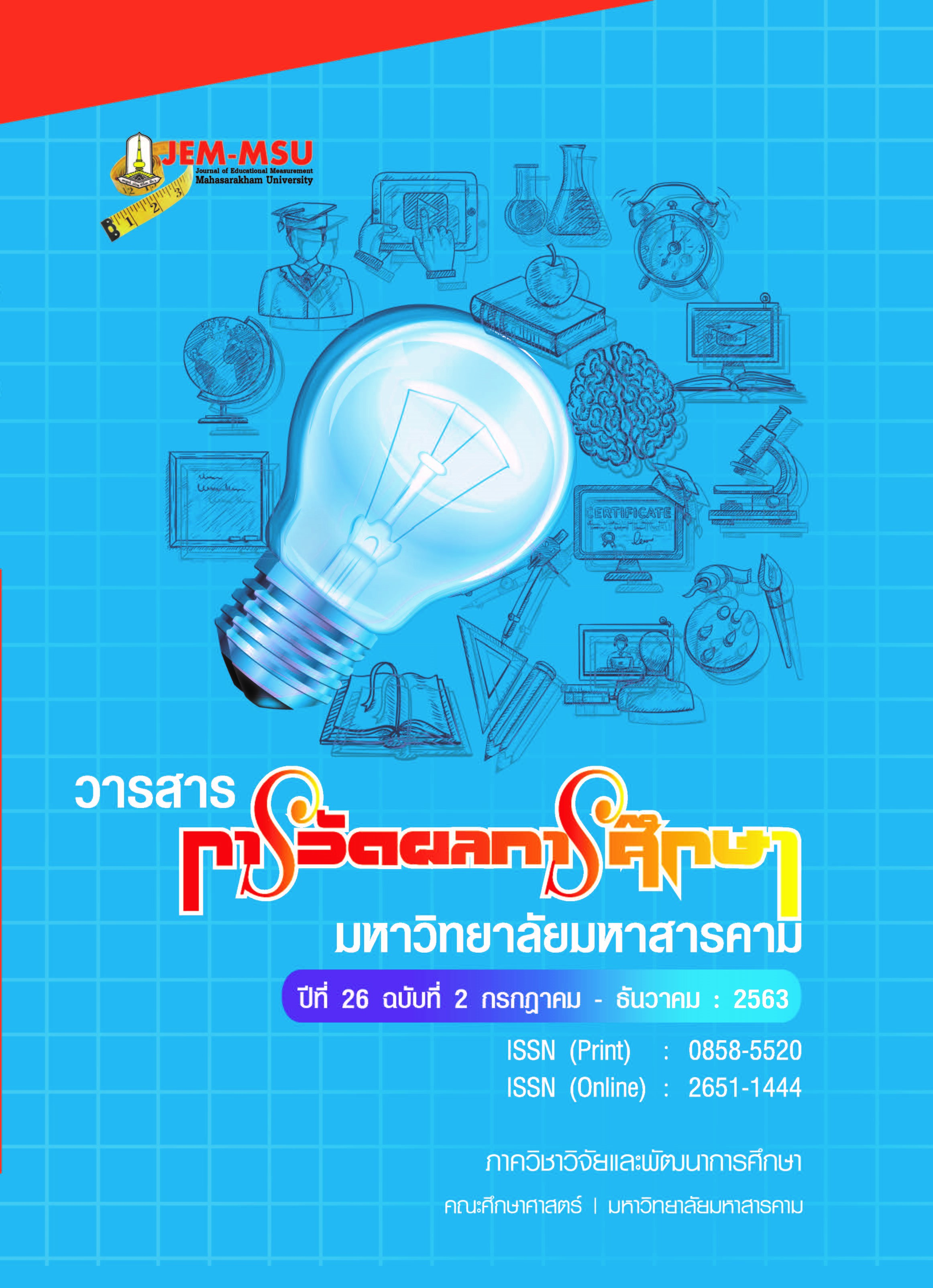Development of Teacher Training Curriculum for Developing Teacher’s Ability in Doing Classroom Research Using Research-based Development Together with Lesson Study
Main Article Content
Abstract
The objectives of this research were: 1) to study the current state, problems and needs related to development of knowledge and ability in doing classroom research; 2) to develop a training curriculum for improving teacher’s ability in doing classroom research; 3) to develop the ability in doing classroom research of the teachers who had passed the training curriculum. The research was conducted in 3 phases. Phase 1 was a study on the current state, problems and needs related to development of knowledge and ability in doing classroom research by using the focus group and testing the basic concept related to classroom action research with 8 teachers and the school executives of Watchaemarom School, the Office of Roi-et Primary Education Service Area 2, in the academic year 2017. Phase 2 dealt with the drafting of the training curriculum for improving teacher’s ability in doing classroom research. Phase 3 dealt with implementing the training curriculum. The target group consisted of 16 teachers of Watchaemarom School. Four teachers volunteered to plan classroom action research and 2 teachers voluntarily presented their research reports in order to develop their ability in doing classroom research. The research instruments were: a 20-item objective test to measure the knowledge and ability in doing classroom action research; a classroom action research proposal assessment form; and a classroom action research report assessment form. The statistics employed in data analysis were percentage, the mean and standard deviation.
The research results were as follows:
1. Regarding the current state of Watchaemarom School, the lecture-based method of teaching was mainly used to cover the curriculum in time. The teachers lacked the knowledge and understanding about the learning and teaching innovation needed to be applied to their classrooms. The students in both primary and lower secondary education levels had their learning achievements in a problematic level. The students’ higher order thinking skill was lower than the standard. The teachers had the knowledge and understanding of classroom research in the moderate level and did not have any experience of doing research for solving learning and teaching problems. Most of the teachers needed to have a workshop on classroom research and to have an expert for consulting and giving advice while doing research.
2. The training curriculum consisted of 7 components: 1) principles, 2) objectives, 3) structure, 4) content 5) activities and time allotted, 6) training’s media, and 7) measurement and evaluation. The experts’ evaluation indicated that all of the components were very proprietary.
3. The ability in doing classroom research of the teachers who passed the training curriculum was as follows:
3.1 The teachers’ knowledge and understanding in classroom research increased 56.02 percent. The mean score of their pretest was 10.50 while posttest yielded 16.69.
3.2 The teachers who passed the training curriculum had a research proposal rated in the moderate level ( =3.29, S.D. = 0.08). They were able to develop the research instruments and conduct their research according to their research plan. Finally, they had their research rated in the high level (
= 3.59, S.D. = 0.01).
Article Details
The content and information contained in the published article in the Journal of Educational Measurement Mahasarakham University represent the opinions and responsibilities of the authors directly. The editorial board of the journal is not necessarily in agreement with or responsible for any of the content.
The articles, data, content, images, etc. that have been published in the Journal of Educational Measurement Mahasarakham University are copyrighted by the journal. If any individual or organization wishes to reproduce or perform any actions involving the entirety or any part of the content, they must obtain written permission from the Journal of Educational Measurement Mahasarakham University.
References
กระทรวงศึกษาธิการ. (2545). การวิจัยเพื่อการเรียนรู้. กรุงเทพฯ: โรงพิมพ์คุรุสภาลาดพร้าว.
กุลยา ตันติผลาชีวะ. (2537). การฝึกอบรม. กรุงเทพฯ: คณะศึกษาศาสตร์ มหาวิทยาลัยศรีนครินทรวิโรฒ.
ขนิษฐา ศรีตะวัน. (2558). การพัฒนาหลักสูตรฝึกอบรมเพื่อเสริมสร้างสมรรถนะการวิจัยในชั้นเรียน สำหรับครู โรงเรียนประถมศึกษาในภาคตะวันออกเฉียงเหนือตอนล่าง. รมยสาร, 13(1), 191-192.
ชนิดา ยอดสาลี และกาญจนา บุญส่ง. (2559). ปัจจัยที่ส่งผลต่อผลสัมฤทธิ์ทางการเรียนของนักเรียนในสังกัดสำนักงานเขตพื้นที่การศึกษาประถมศึกษาประจวบคีรีขันธ์ เขต 2. Veridian E-Journal, 9(1), 1208-1223.
ณัฎติยาภรณ์ หยกอุบล. (2555). ปัจจัยที่ส่งผลต่อผลสัมฤทธิ์ทางการเรียนวิชาวิทยาศาสตร์ ของนักเรียนระดับชั้นประถมศึกษาปีที่ 6 โรงเรียนสาธิตสังกัดสำนักงานคณะกรรมการการอุดมศึกษา กระทรวงศึกษาธิการ. วารสารการศึกษาและพัฒนาสังคม, 8(1), 85-102.
นงลักษณ์ วิรัชชัย. (2551). หลักสูตรฝึกอบรมการวิจัยขั้นสูงแบบบูรณาการทางจิตพฤติกรรมศาสตร์. กรุงเทพฯ : พริกหวานกราฟฟิค.
บุศรา เต็มลักษมี. (2558). ปัจจัยที่มีความสัมพันธ์ต่อผลสัมฤทธิ์ทางการเรียนวิชาภาษาอังกฤษของนักเรียนชั้นมัธยมศึกษาตอนต้น จังหวัดประจวบคีรีขันธ์ สังกัดสำนักงานเขตพื้นที่การศึกษา มัธยมศึกษา เขต 10. วารสารวิทยบริการ มหาวิทยาลัยสงขลานครินทร์, 26(3), 26-36.
ประวิต เอราวรรณ์. (2542). การวิจัยในชั้นเรียน. กรุงเทพฯ : ดอกหญ้าวิชาการ.
ฝ่ายวิชาการโรงเรียนวัดแจ่มอารมณ์. (2559). รายงานผลการปฏิบัติงานประจำปีการศึกษา 2559. มหาสารคาม : โรงเรียนวัดแจ่มอารมณ์.
พัชรี ศรีสังข์. (2560). การพัฒนาหลักสูตรฝึกอบรมการวิจัยปฏิบัติการสำหรับครู ศูนย์การศึกษานอกระบบและการศึกษาตามอัธยาศัยอำเภอ.วารสารสังคมศาสตร์ มหาวิทยาลัยศรีนครินทรวิโรฒ, 20(1), 122-123.
ทิศนา แขมมณี. (2554). ศาสตร์การสอน. กรุงเทพมหานคร : สำนักพิมพ์จุฬาลงกรณ์มหาวิทยาลัย.
พิชิต ฤทธิ์จรูญ. (2547). การวิจัยเพื่อพัฒนาการเรียนรู้: ปฏิบัติการวิจัยในชั้นเรียน. กรุงเทพฯ : คณะครุศาสตร์ สภาบันราชภัฏพระนคร.
ไพบูลย์ อ่อนมั่ง. (2557). การพัฒนาหลักสูตรฝึกอบรม เพื่อพัฒนาทักษะการวิจัยปฏิบัติการในชั้นเรียน. กรุงเทพฯ: สาขาการวิจัยและพัฒนาหลักสูตร บัณฑิตวิทยาลัย มหาวิทยาลัยศรีนครินทรวิโรฒ.
มารุต พัฒผล. (2556). การเสริมสร้างความสามารถในการจัดการเรียนรู้โดยใช้วิจัยเป็นฐาน. วารสารวิจัยและพัฒนาหลักสูตร, 3(1), 15-27.
ฆนัท ธาตุทอง. (2553). การพัฒนาหลักสูตรสถานศึกษาตามหลักสูตรแกนกลางการศึกษาขั้นพื้นฐาน พุทธศักราช 2551. (พิมพ์ครั้งที่ 2). นครปฐม : เพชรเกษมการพิมพ์.
ราชบัณฑิตยสถาน. (2551). พจนานุกรมศัพท์ศึกษาศาสตร์ฉบับราชบัณฑิตยสถาน. กรุงเทพฯ : อรุณการพิมพ์.
วิจารณ์ พานิช. (2562). วิจัยชั้นเรียนเปลี่ยนครู. กรุงเทพฯ : มูลนิธิสยามกัมมาจล.
วิชาญ พันธุ์ประเสริฐ. (2551). การพัฒนาหลักสูตรฝึกอบรมครูวิทยาศาสตร์เพื่อออกแบบบทปฏิบัติการที่สอดแทรกภูมิปัญญาท้องถิ่น. ปริญญานิพนธ์ กศ.ด. กรุงเทพฯ: มหาวิทยาลัยศรีนครินทรวิโรฒ.
สุวิมล ว่องวานิช. (2558). การวิจัยประเมินความต้องการจำเป็น. พิมพ์ครั้งที่ 3. กรุงเทพฯ : สำนักพิมพ์แห่งจุฬาลงกรณ์มหาวิทยาลัย.
สมบัติ ท้ายเรือคำ. (2551). ระเบียบวิธีวิจัยสำหรับมนุษย์ศาสตร์และสังคมศาสตร์. กาฬสินธุ์ : ประสานการพิมพ์.
สมคิด บางโม. (2554). เทคนิคการฝึกอบรมและการประชุม. (พิมพ์ครั้งที่ 3). กรุงเทพฯ: วิทยพัฒน์.
สำนักงานเลขาธิการสภาการศึกษา. (2561). สภาการศึกษาเสวนา 2016-2017: บทบาทการศึกษาไทยในยุคไทยแลนด์ ๔.๐. กรุงเทพฯ: สำนักงานเลขาธิการสภาการศึกษา.
Beebe, S.A., Mottet, T.P and Roach, K.D. (2004). Training and Development: Enhancing Communication and Leadership Skills. New York: Pearson and AB.
Pramley, P. (1991). Evaluating Training Effectiveness: Translating Theory into Practice. London: McGraw-Hill.


